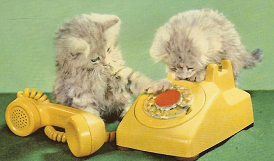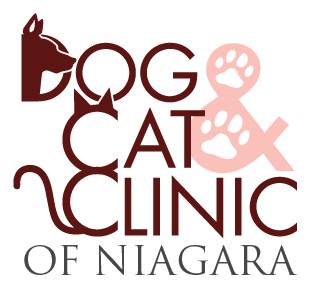
If you’re looking for a dog and cat vet in St. Catharines, Welland or Niagara – you’ve come to the right place!
Read the article below about spaying and neutering, written by your local expert veterinary hospital serving St. Catharines, Welland and Niagara! At the Dog & Cat Clinic of Niagara in St. Catharines, Ontario we believe there are many benefits to spaying or neutering your pet. We hope this information will help you to make an informed decision but, as always, our expert veterinary medical and surgical team are here to answer all of your questions.
Let’s start with some definitions and what to expect:
“Spay” or “Spaying” refers to surgery performed on a female cat or female dog and is another word for OVARIOHYSTERECTOMY. This procedure involves abdominal surgery where both ovaries and the uterus are removed. There will be an abdominal incision with sutures. The skin sutures will either be dissolvable or will need to be removed when the incision has healed. At our Niagara veterinary hospital, your pet will return to us for a visit approximately one week after her surgery to check the incision and remove the stitches if necessary. More Information About Spaying Your Cat! “Neuter” or “Neutering” refers to surgery performed on a male cat or male dog and is another word for “ORCHIDECTOMY”. This procedure involves an incision into the scrotal sac. The testicles and spermatic cords are surgically removed. Typically, because the incisions are so tiny, they are not sutured but rather, left open to drain. This drainage is minimal but important for healing. Your boy will return to our St. Catharines veterinary hospital approximately one week later to check his incisions. More Information About Neutering Your Cat!
Questions for Our Niagara Veterinarians?
We love to help you learn. Every question is important! If you are struggling with the decision to spay or neuter your cat, please call our veterinary hospital in St. Catharines, Ontario at 905.687.1805 and we can discuss your concerns. When should I spay or neuter my pet?
- Typically this surgery is performed in a veterinary hospital around 6 months of age. In shelter situations, it may be done as early as 8 weeks of age as their goal is to enable early adoption. At the Dog & Cat Clinic of Niagara we prefer the kitten weighs approximately 4 ½ to 5 pounds, assuring as low a risk as possible for the anesthesia.
Why should I spay my dog/cat?
- Most people are aware that spaying will decrease overpopulation. There are also important medical reasons for spaying your pet. It has been shown to significantly decrease the risk of developing MAMMARY CANCER later in life by spaying your pet when she is young. By removing the source of a hormone called estrogen before the first heat, the risk of this breast cancer is virtually eliminated. If your pet has already experienced a heat there is still good reason to spay early—each successive heat will continue to increase her mammary cancer risk—so it is never too late.
- With every heat there is also the risk of developing a life threatening uterus infection called PYOMETRA. This condition requires prompt spaying. Often the cat or dog is very sick. The uterus, which is full of pus, is very fragile and there is a risk of rupture or tearing of the uterus during surgery. The pet is also at risk for the uterine bacteria to entire the bloodstream causing a systemic infection.
Why should I neuter my pet?
- Dogs and Cats that are not neutered will mark their territory by spraying urine. This natural instinct is driven by hormones and significantly increases after the age of 6 months. They will also want to roam and can become more inclined to fight.
- Neutering significantly decreases and often eliminates these instinctive behaviours—increasing your pet’s safety and chances at a long and healthy life.
Will my pet gain weight?
- After spaying or neutering it is normal for your pet’s metabolism to slow down. To prevent weight gain, a small adjustment in the amount and type of food you are feeding is all that is needed to prevent weight gain. Our veterinary team at the Dog & Cat Clinic of Niagara in St. Catharines are Certified Nutritional Counsellors. During your recheck appointment we will guide you through this important nutritional transition.
A word about the COST of Spaying or Neutering your Pet…
We understand at the Dog & Cat Clinic of Niagara that asking the cost of a procedure is only natural—especially in today’s economy. We take our responsibility of educating our clients seriously. With this in mind, we would encourage you to consider this…”Not All Spays and Neuters are Considered Equal”.
“At Our Veterinary Hospital In St. Catharines, Ontario – Your Pet’s Health is Our Primary Concern”
 At the Dog & Cat Clinic of Niagara, your pet’s health is our primary concern. At our Niagara veterinary hospital all of our patients receive a full physical exam by a veterinarian and pre-anesthetic blood testing prior to their surgery. IV fluid therapy, balanced anesthesia and a pain management plan based on current protocols will minimize your dog or cat’s risk and maximize their comfort during the surgery and the post-operative period. For added safety and comfort your pet’s body temperature will be monitored and maintained on a specially designed warming surgical table. Our patients are monitored by a Registered Veterinary Technician (www.OAVT.org) every step of the way. The surgery will be performed in a dedicated surgical suite with the utmost attention to sterility. Following surgery you will be given complete discharge instructions and we will answer any questions you may have in a personalized appointment. We know this can be a worrisome time for our families. We are here to help. For more information on the questions to ask when choosing a veterinarian to spay or neuter your pet please contact our veterinary hospital serving Niagara, Welland & St. Catharines! 905-687-1805
At the Dog & Cat Clinic of Niagara, your pet’s health is our primary concern. At our Niagara veterinary hospital all of our patients receive a full physical exam by a veterinarian and pre-anesthetic blood testing prior to their surgery. IV fluid therapy, balanced anesthesia and a pain management plan based on current protocols will minimize your dog or cat’s risk and maximize their comfort during the surgery and the post-operative period. For added safety and comfort your pet’s body temperature will be monitored and maintained on a specially designed warming surgical table. Our patients are monitored by a Registered Veterinary Technician (www.OAVT.org) every step of the way. The surgery will be performed in a dedicated surgical suite with the utmost attention to sterility. Following surgery you will be given complete discharge instructions and we will answer any questions you may have in a personalized appointment. We know this can be a worrisome time for our families. We are here to help. For more information on the questions to ask when choosing a veterinarian to spay or neuter your pet please contact our veterinary hospital serving Niagara, Welland & St. Catharines! 905-687-1805
